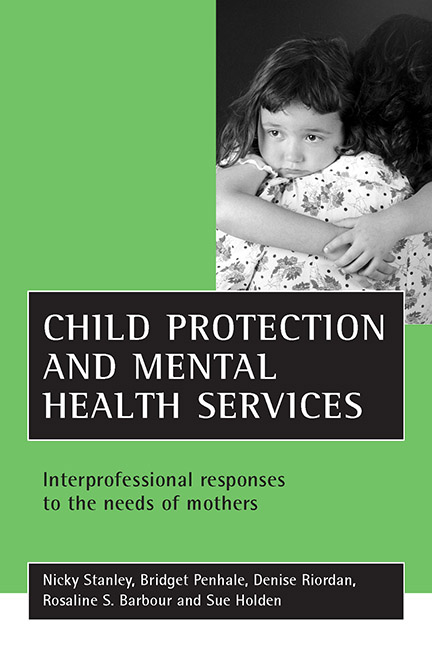Book contents
- Frontmatter
- Contents
- List of tables and figures
- Introduction
- one Mental health needs and mothering
- two The service context
- three Interprofessional work
- four The research study
- five Identifying key research issues
- six Mothers’ perspectives
- seven The mothers’ evaluations of professional support
- eight The professionals and their practice
- nine Conceptualising needs and evaluating risk
- ten Interprofessional communication and coordination
- eleven Identifying appropriate resources
- twelve Conclusion
- References
- Index
- Also available from The Policy Press
eight - The professionals and their practice
Published online by Cambridge University Press: 20 January 2022
- Frontmatter
- Contents
- List of tables and figures
- Introduction
- one Mental health needs and mothering
- two The service context
- three Interprofessional work
- four The research study
- five Identifying key research issues
- six Mothers’ perspectives
- seven The mothers’ evaluations of professional support
- eight The professionals and their practice
- nine Conceptualising needs and evaluating risk
- ten Interprofessional communication and coordination
- eleven Identifying appropriate resources
- twelve Conclusion
- References
- Index
- Also available from The Policy Press
Summary
The sample
This chapter moves from the mothers’ perspectives discussed in the previous chapter to consider the views and experiences of the wide range of professionals involved in delivering services to children and families. The extent of their experience with families where mothers’ mental health needs and child care concerns coincide is explored here, as are their views of their professional roles and remits in relation to such families. First, however, we describe the key characteristics of the professionals who contributed to the research. Respondents were contacted in the two study sites (A and B) using staff listings provided by local services. Postal questionnaires were sent out to health and social care practitioners and middle managers, staff in voluntary organisations, including children's guardians (formally known as Guardians ad Litem), and police officers with responsibilities for child protection. Professionals were included in the survey on the basis of their involvement in work with families where mental health needs and child care concerns coincided and according to the perceived relevance of the research to their core business. Some professionals, such as teachers, were excluded since they only occasionally work with whole families with mental health needs and the survey was not considered to be sufficiently germane to their core task (see Birchall with Hallett, 1995). A group of residential child care workers who undertook outreach work with families were included in the survey in site B as their experience appeared relevant.
The 500 practitioners (327 in Site A and 173 in Site B, the smaller site) who responded to the survey from both areas covered a wide range of professionals (Table 8.1). As in any locality, the different groups are not equally represented, but the power wielded by any one profession within a local network derives less from their numbers and more from their relative status. The overall response rate for the two areas was 50.5%, with little difference in the interest evoked by the survey in the two areas.
The response rates of the different professionals varied considerably, with most groups ranging from 42% to 70%. High response rates (>75%) were achieved from community psychiatric nurses (CPNs), child and adolescent psychiatrists and occupational therapists (OTs) in mental health services. Low response rates (<5%) were obtained from GPs, nurses on mental health units and wards, and accident and emergency staff.
- Type
- Chapter
- Information
- Child Protection and Mental Health ServicesInterprofessional Responses to the Needs of Mothers, pp. 75 - 82Publisher: Bristol University PressPrint publication year: 2003



